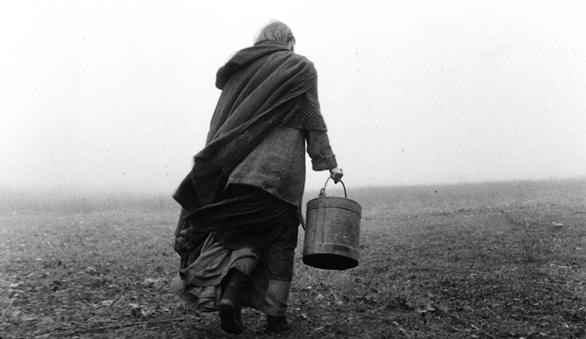CIFF: The Turin Horse, Natural Selection
By Steven Pate in Arts & Entertainment on Oct 7, 2011 7:00PM
 This is part of Chicagoist's coverage of the Chicago International Film Festival.
This is part of Chicagoist's coverage of the Chicago International Film Festival.
What is the opposite of escapism? When we say we mostly go to the movie theater to be transported, what do we mean? Look at the 2010 box office leaders: five animated fantasies, two supernatural teenager epics, one superhero sequel, an Alice in Wonderland and a movie that is about turning dreams into action sequences.
Often we say we are willing to give our attention to a movie in the hopes that it will be turned on something more pleasurable than the banality or even unpleasantness of their quotidian existence. Ever since Will Hays, the first president of the precursor to the MPAA, said in 1934 that the movies were the key to "maintenance of the national morale during a period featured by revolution, riot and political turmoil in other countries," it has become conventional wisdom that during tough times our appetite for diversionary fare increases. Does escaping via movie theater make us less likely to change the conditions that made us seek escape?
Béla Tarr's The Turin Horse is a film which is stakes out its territory at the opposite end of the spectrum, a work the director has claimed is "about the heaviness of human existence." Opening with an anecdote regarding the horse whose refusal to move and subsequent, brutal beating may have coincided with Friedrich Nietzsche's ultimate psychological breakdown, the film depicts six days in the life of a workhorse, its decrepit driver and his daughter. As a howling windstorm rages around their meager house, isolated in the barren Hungarian hills, we see them rise in the morning, perform their chores, cook and eat potatoes, and generally live their miserable life. The two barely speak. When a loquacious neighbor comes by for some of the Hungarian hooch they fortify themselves with every morning, or a band of opinionated gypsies helps itself to their well, these ruptures of the nearly wordless spell crash like thunder. The horse refuses to eat. The well runs dry. The fire goes out. They try to leave but there is no escape.
Films about such dreary things have no right to be this beautiful. But there is no slight of hand here, merely the exquisite, languidly mobile camera work and rapturously severe cinematography of Fred Kelemen adorning Tarr's gift at fashioning an endlessly immersive world from the testimony of very humble components. This film has fostered many comparisons to the work of Samuel Beckett, and while it shares a refusal to flinch before what can only be described as absolute bleakness, there is none of that humor or subdued but literate wordplay here. Who knows, if Sergei Eisenstein had granted Beckett's request to teach him film-making in the 1930s something this fluently cinematic may have been the end product.
If we offer our gaze to Tarr's film, the last thing he would permit is its escape. Rather, he would turn it back onto the very physical world from which we can never escape, in all of its brutal beauty. Perhaps it's because we've been seeing a few pairs of 500-dollar shoes spin 180 degrees on the LaSalle Street sidewalk to reverse course and escape from a crowd of people insisting on realities they don't much care for, but we feel like maybe the opposite of escapist fare might be one of occupation, and that is something we also need a dose of from time to time. Here is an art that forces you to take possession, if not ownership, of the space in which you find yourself and to dwell on it: an occupationist cinema.
The Turin Horse screens Thursday, Oct. 13 at 7:15 p.m. and Saturday, Oct. 15 at 2 p.m.
Natural Selection comes to CIFF with a heap of expectations aroused by its snagging of several awards at South by Southwest earlier this year, including audience and jury awards for best narrative feature, and receiving high praise at Ebertfest as well. We think first-time director Robbie Pickering may be onto something here. Rachael Harris stars as a Christian housewife overly devoted to a dying husband who had sworn off sex when she was diagnosed as barren, on a journey from suburban Texas to reunite the husband with a long-lost son sired via sperm bank. The son turns out to be a down-and-out junkie in Tampa, and the film gradually loses speed during the picaresque travails along the way home before pick up to cross the finish line in fine fettle. Harris's performance (she will be remembered to many now as Ed Helms' girlfriend in The Hangover) is a joy, and despite a few bumps in the road this is a funny, touching and entertaining ride.
Natural Selection plays Saturday, Oct. 15 at 8:40 p.m. and Sunday, Oct. 16 at 3 p.m.